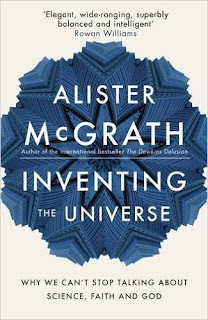Alister McGrath writes both as a
scientist and as a Christian. He relishes the exploration of our vast universe,
yet agrees with Einstein’s view that nature ‘shows us only the lion’s tail.’
McGrath believes that this tail hints at the ‘majesty and grandeur of the
magnificent animal to which it is attached, and to which it ultimately leads.’
For McGrath, Professor of Science and
Religion at Oxford University, there need be no conflict between science and
religion as he explains in his new book Inventing
the universe.
Many of those who are ‘opinion formers’
in our culture, assume that it is inevitable that scientists will be atheists.
They have been influenced by the writings of ‘New Atheists’, such as Richard
Dawkins, who are on a mission against God. And when something is held to be
self-evident by the opinion formers, it takes courage to question it.
Alister McGrath is himself an opinion
former. He describes his own journey. As a highly-perceptive teenager he was an
atheist, believing that that only what could be proved was real, and true, and
that science already possessed, or was on the way to uncovering answers to all
the questions the universe poses.
But young McGrath discovered not only
that scientific theories were often revised or discarded as new facts were
discovered, but also that there is a range of questions which science is not in
a position to answer.
Science can answer the ‘how’ questions –
how the universe works. It can’t address the important ‘why’ questions – why does
the universe exist?; does my life have any meaning and purpose?
There are different, legitimate ways of
looking at reality. McGrath uses an example of water boiling in a kettle.
Science describes the process in terms of electricity producing heat, and the
effect of heat upon water molecules: the ‘how’ questions. Science can’t tell us
that the reason the process is taking place on a given occasion is that I’m
making a cup of coffee; the ‘why’ question.
On the basis of evidence about the
natural world, biology, and evolution Richard Dawkins makes sweeping and
dogmatic statements about the absence of God – but these do not arise from the
evidence itself.
It’s not just scientists who have made
mistakes of this kind. Some religious people have wrongly read religious works
such as the Bible as though they were scientific text-books. But they aren’t!
As Christians in the early centuries of the Church recognised, the Bible is
answering the ‘why’ questions about the universe, but not the ‘how’ questions. Once
we realise this, the potential for conflict between science and faith is reduced.
Alister McGrath writes about the way
scientists work. They observe, they construct a theory which best describes the
evidence. For many centuries, for example, it was believed that the earth was
at the centre of the universe. But often, new discoveries don’t ‘fit in’ to a
theory, which has to be increasingly tweaked to accommodate them. And then, in a moment of clarity, someone
realises that there is a better, more elegant way of explaining the evidence,
and a new theory is born – for example in 1543 Copernicus suggested that in
fact everything revolves around the sun.
There are different theories to describe
the ‘why’ questions too. For example, the atheist theory; the theistic theory –
that there is a designer behind the universe; the Christian theory, that the
God who wears the universe like a garment came among us in Jesus.
Alister McGrath acknowledges that there
are questions – notably the question of suffering – which don’t sit easily with
the Christian theory, but he believes that it makes the greatest sense in part because
of its power to explain. He quotes C. S. Lewis ‘I believe in Christianity as I
believe that the Sun has risen, not only because I can see it, but because by
it I can see everything else.’
One lesson of all this, is that we must
always dare to question opinion formers, while also remembering our own
‘confirmation bias’ – our tendency to seize on evidence which confirms our
existing views, while ignoring uncomfortable truths which raise questions about
these views. Alister McGrath as an opinion former himself, is very open to
having his views challenged.
But we must also be ready to question
Christian opinion-formers – for example those who suggest that the Bible does
hold ‘how’ answers. And if our church does not encourage thoughtful
questioning, then perhaps we should consider if we are in the right church.
And we must question the theories we
hold. Do they fit the evidence? Or is the constantly-creating God prompting us
towards a new, more expansive theory, one which births joy in us as we see the
great Lion at the centre of all things?
Inventing the Universe by Alister
McGrath. Hodder and Stoughton, ISBN 978 1 444 79845 6
(Christian Viewpoint column from the Highland News dated 21st January 2016)



No comments:
Post a Comment